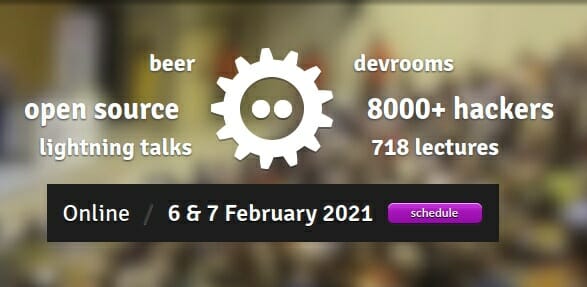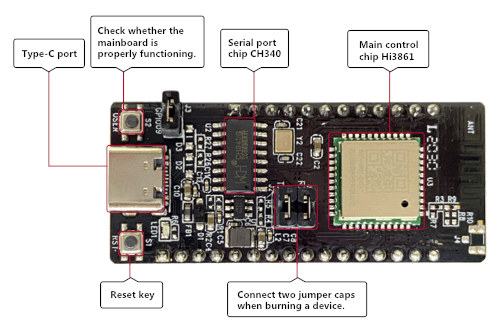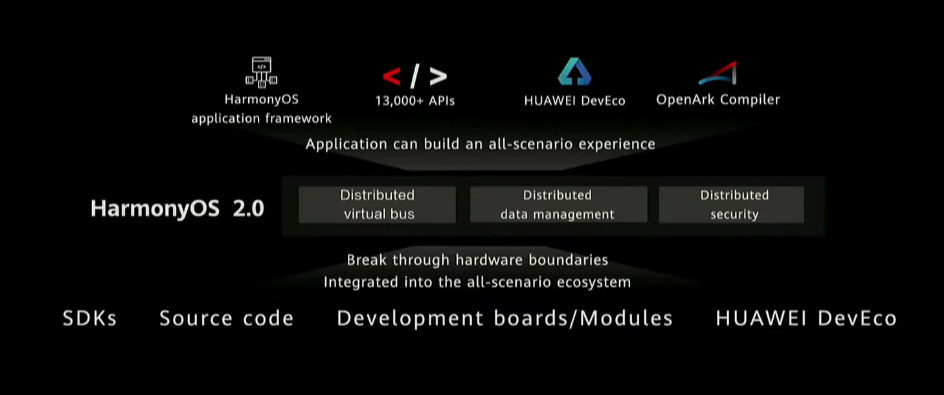FOSDEM is an open-source developer event that takes place on the first week-end of February every year in Brussels, Belgium. Every year except this year, as due to COVID-19 restrictions, FOSDEM 2021 will take place online like most events these days. The schedule has been up for some time, and today I’ll look at some of the interesting talks mostly from the Embedded, Mobile and Automotive “virtual devroom” but also other tracks. Saturday, February 6, 2021 13:00 – 14:00 – From Reset Vector to Kernel – Navigating the ARM Matryoshka Long gone are the times of executing the OS in-place from memory-mapped flash upon reset. A modern SoC now comes with complex mask ROM firmware, with driver, filesystem, protocol and crypto support for loading… yet another bootloader. In his talk, Ahmad follows this chain of bootloaders until the kernel is started, stopping along the way for RAM setup, peripherial initialization, […]
Hi3861 based HiSpark WiFi IoT development board supports LiteOS and HarmonyOS
HiHope HiSpark WiFi IoT development board features Hisilicon Hi3861 microcontroller with 2.4 GHz 802.11b/g/n WiFi 4 and supports Huawei LiteOS as well as HarmonyOS. Equipped with 2MB flash and 384KB SRAM, the board targets smart home applications, and ships with a baseboard to help with development. HiSpark board specifications: MCU – Hisilicon Hi3861 32-bit microcontroller @ up to 160 MHz with 352 KB SRAM and 288 KB ROM, 2 MB flash memory, and WiFI 4 connectivity; QFN-32 5x5mm package WiFi 802.11b/g/n standard up to 72 Mbps @ HT20 2.4 GHz frequency band (ch1-ch14). Station (STA) and access point (AP) modes with up to 6 clients for the latter WiFi mesh with up to 256 nodes Security – WPA, WPA2 personal, and WPS 2.0 PCB antenna USB – 1x USB Type-C port for power and programming via CH340 chip Expansion – 2x headers with up to 2x SPI, 2x I2C, 3x […]
HarmonyOS 2.0 Beta Released, HarmonyOS Devices Coming in 2021
Due to geopolitical tensions, Huawei cannot rely on Google Android operating system over the long term, and in May 2019 we reported HongMeng OS may become Huawei’s OS alternative to Android. HongMeng (鸿蒙) OS will finally be called HarmonyOS outside of China, and we recently reported Huawei was trying to attract more developers with monetary incentives to brings more apps to HMS (Huawei Mobile Services). We now have a more clear timeline with the company’s recent release of HarmonyOS 2.0 beta that’s currently available for smart home applications, smartwatches, and head-on-displays, and will become available for smartphones in December 2020. The release includes SDKs with over 13,000 APIs, documentation, tools, and simulator/emulator. OpenArk is an open-source compiler that was released last September, and Huawei DevEco is the IDE for development that works on top of Android Studio. Huawei also introduced OpenHarmony which should be the equivalent of the Android Open […]
Huawei Pledges One Million Dollars in Huawei Mobile Services App Innovation Contest
Those are challenging times for Huawei with the company having to stop developing and manufacturing Kirin processors, and their temporary license to get support from Google has recently expired. But necessity is the mother of inventions, so Huawei has stocked up on chips to give it time to find alternatives and is developing its own software ecosystem. But app developers won’t simply spend time working on apps for the platform without some incentive, so Huawei has launched the HMS App Innovation Contest with one million dollars in prize money. HMS stands for Huawei Mobile Service and looks like the equivalent of GMS, with the app store being called “HUAWEI AppGallery”. The contest is open to developers in most countries, but unsurprisingly there’s no option for developers in North America (USA/Canada). However, the contest is global and it still looks possible to get a Huawei ID from any country. The schedule […]
Huawei Releases their Open Source Ark Compiler for HarmonyOS
Back in May, there were rumors Huawei was working on HongMeng OS as an alternative to Android mobile operating systems, as the OS was brought to light due to US sanctions against the company. The new operating system was later confirmed and will be called HarmonyOS outside of China. A few days ago I received a tip in Chinese with this link explaining Huawei had released the open-source Ark compiler for HarmonyOS aka OpenArkCompiler. The compiler works with Java apps and converts the source into AArch64 binaries. The illustration below implies it should also work with C, C++, JavaScript, and Kotlin programming languages. Three links were shared in the announcement: The official website – https://www.openarkcompiler.cn/home The code hosting website – https://code.opensource.huaweicloud.com/openarkcompiler/openarkcompiler/home A mirror for the code – https://gitee.com/harmonyos/OpenArkCompiler As a side note, I had never heard about Gitee, and the site is an alternative to Github in China, which may […]
HongMeng OS is Huawei’s Alternative to Android (Rumor)
If you’ve been following the news, you must know Huawei was hit by trade restrictions from the US government, and US companies announced they’d comply meaning Intel, Google, Qualcomm, Microsoft, Xilinx, and others announced they’d have to mostly stop doing business with Huawei. At first, it seemed like all Google services would stop working on existing Huawei phones, but it’s not that bad, and apparently, it only impacts phones sold after May 16. Everything is still in flow, so it may take a while for things to settle down, and find out what the practical implications will be. Nevertheless, upon reading the news, I thought it would be a boon for projects like /e/ operating system that works without closed-source binaries from Google, but it turns out that Huawei is working on its own operating system called HongMeng (鸿蒙) OS according to Chinese media reports. We don’t have a whole […]








